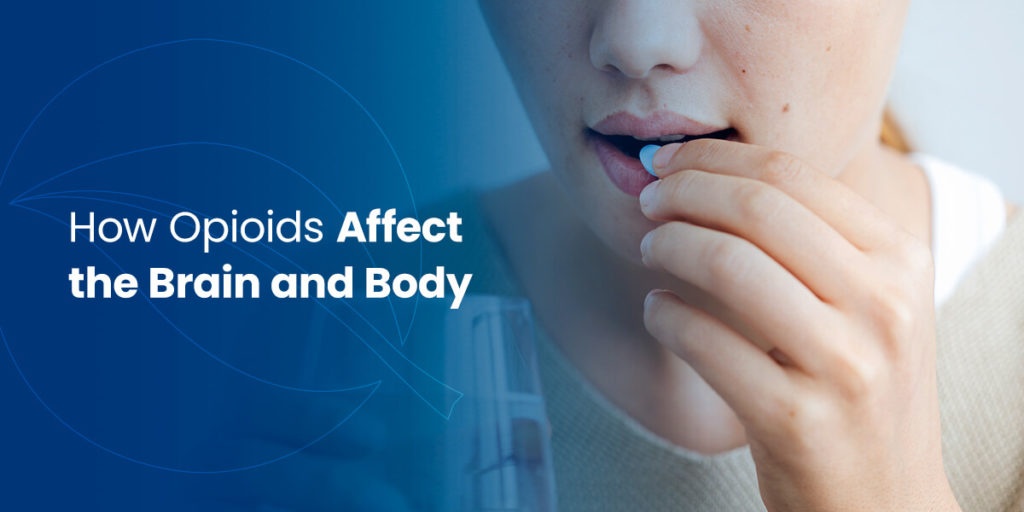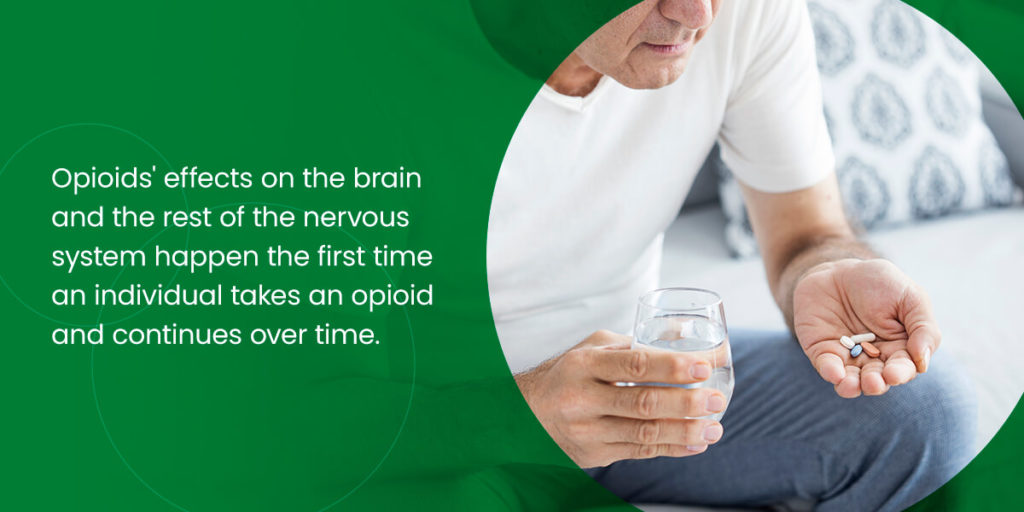

The United States has an opioid crisis. Since 1999, more than 760,000 people have died from a drug overdose. Many of those deaths are linked to opioid use. To understand how people develop an opioid use disorder, we must understand how opioids affect the brain and the body.
In the late 1990s, pharmaceutical companies told the healthcare industry and the public that opioids were not addictive. Legal prescriptions for these drugs, such as oxycodone, morphine, and hydrocodone increased. As prescriptions increased, so did misuse. Today, we know that opioids, whether prescription or illegal, have significant impacts on the human brain and body that can lead to addiction.
Learn what happens to the brain and body when you take opioids.

The human nervous system includes the central nervous and peripheral nervous systems. The brain and spinal cord make up the central nervous system, while the nerves that extend from the spinal cord throughout the body make up the peripheral nervous system.
Opioids’ effects on the brain and the rest of the nervous system happen the first time an individual takes an opioid and continues over time. Opioids are designed to relieve pain, and they are often prescribed for people recovering from an operation or living with chronic pain. When a person takes an opioid, it enters the body and binds to receptors in the nervous system, referred to as opioid receptors. This provides the body with pain relief.
Sedation and pain relief are immediate effects of opioid use, but there are also long-term impacts on the nervous system. Opioid receptors are a part of the brain’s reward pathway. In addition to providing pain relief, opioids create a feeling of euphoria, often referred to as a high. Individuals might experience pleasure when taking opioids, which could trigger the brain’s reward pathway.
Over time, some people begin to crave opioids to recreate that pleasurable feeling but will eventually need more opioids to capture that same feeling. The same dose will no longer provide the same pain relief or pleasure. They may feel they need more and develop a craving for the substance to achieve that high.
The respiratory system is what helps us breathe. The lungs, blood vessels and airways are all part of this system. One of the reasons opioids are so dangerous is that they cause respiratory depression and slow breathing. Breathing is an autonomic function, meaning we do not need to think about it. The central nervous system controls the respiratory system. When someone consumes too many opioids, their breathing will slow or even stop completely.
Opioid misuse can cause brain damage. When someone experiences a severe overdose, it is possible that the brain will be deprived of oxygen. This may cause brain damage with a variety of symptoms, such as memory loss, impaired coordination or depression.
The heart, blood vessels and blood are the main components of the cardiovascular system. Opioids slow the heart rate, which can be potentially deadly. These drugs can also have long-term consequences that impact cardiovascular health. For example, opioid use is associated with an increased risk of atrial fibrillation, which often leads to stroke. Injection of heroin, an illegal opioid, can lead to scarring of the veins, as well as infection of the veins or heart valves.
Opioid effects on the body’s digestive system can cause unpleasant symptoms referred to collectively as opioid-induced bowel dysfunction. When taking opioids, a person may experience:
The endocrine system is made up of a series of glands and organs that use hormones to regulate a number of important bodily functions, including growth and development, energy levels, metabolism, mood and reproduction. With such wide-ranging responsibilities, impacts on the endocrine system can vary significantly.
Long-term opioid use can affect the endocrine system in several ways. Women may experience symptoms such as irregular periods. Men may experience erectile dysfunction and impotence. Both men and women may suffer from loss of libido, osteoporosis and changes in mood, including anxiety and depression.
How opioids affect the body depends on the dosage and the length of time taken. If someone takes a legally prescribed opioid, the effects of the drug will be short-term when used as directed. They can expect to experience pain relief and other side effects, such as drowsiness and disruptions to the digestive system.
It is important to note that opioids are highly addictive, and it is possible to become clinically addicted even with a prescription for a legitimate medical condition. If an individual develops a clinical addiction to opioids, the effects of the drugs can be long-term. People struggling with opioid use disorder may have changes in their behavior and personality, unexplained weight loss and difficulty concentrating. Additionally, intravenous opioid use is associated with hepatitis, human immunodeficiency virus (HIV) and heart infections.
When someone with clinical opioid addiction stops taking opioids, they will experience withdrawal. Withdrawal symptoms include insomnia, chills, sweating, anxiety, diarrhea, vomiting and nausea, among others. The timeline of withdrawal will vary depending on the opioid, but it can take days or weeks. Withdrawal management is important because these unpleasant symptoms can increase the risk of experiencing a recurrence of substance use.
Opioids have a profound impact on the brain and body’s systems, making the cycle of use and clinical addiction difficult to break, but it is possible to move forward with life with the right support.
At Middlesex Recovery, we have a treatment program for opioid use disorder. We treat clinical opioid addiction as the medical condition it is and work with each individual to build a path to long-term recovery. Our qualified medical providers leverage a combination of medication, counseling and behavioral therapy. We work to ease the side effects of opioid withdrawal while helping patients build the tools they need to embrace sobriety.
If you or a loved one is living with opioid use disorder, get in touch with us to learn more about how we can help.

If opioid addiction is impacting your life or the life of someone you care about, reach out to our treatment center. We are here to provide the support and care you need to take the first step toward recovery.
Call 781.303.9936